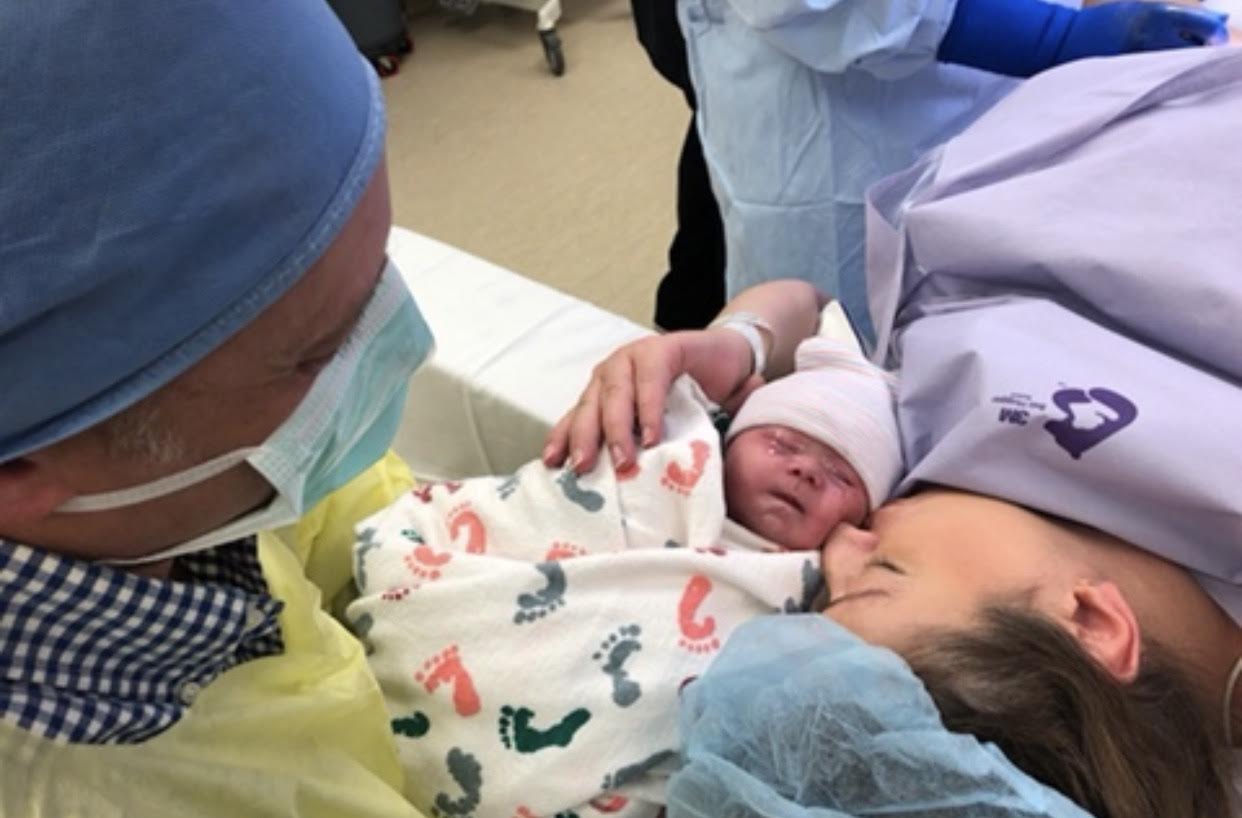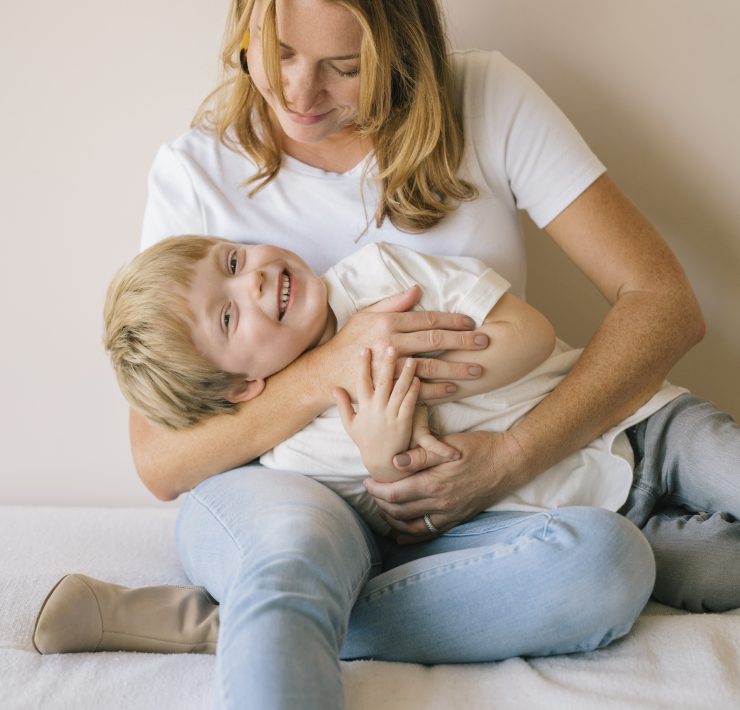
“Do not be scared because a child looks different. They have strong feelings and truly just want to be loved and included.”
Mama of two Ronda Helton is the owner of The Travel Connection Group, a travel agency specializing in luxury, family, and special needs/accessible travel. She is mom to 13-year-old Jack and two-year-old Emma, who was born with Down Syndrome and a major heart defect. In honor of Down Syndrome Awareness Month, Ronda spoke with Raise to share the story of her daughter’s diagnosis, her biggest advice for parents of children with Down Syndrome, and what you should say when your child points out another person’s special need.

On Hiding Her Daughter’s Diagnosis During Pregnancy
We found out when I was pregnant. I was 44 years old, and we had tried for years to have another child. On March 6, 2018, the call came – they were 99% positive that our baby had Trisomy 21, otherwise known as Down Syndrome. We lived in a bubble. We didn’t share the news with many people. Just a few family members, close friends, and neighbors. My husband and I and our son Jack were all just trying to process the news and navigate our new journey.
We were offered an Amnio on several occasions to confirm the results and consider our options. We always quickly declined. I said, “It doesn’t matter if she has Down Syndrome or not. She is our baby, our miracle, our gift.”
As we got closer to her birth, we did start talking publicly about her heart defect. I am extremely active on social media, and I was a frequent visitor at the Fetal Care Center at our local hospital for weekly stress tests and ultrasounds. Part of our new normal. One day, while I was sitting in the waiting room, my Mom called in a panic thinking I was in labor because I had checked-in at the hospital on Facebook. I realized I was going to have to be more specific with my postings and the information I was sharing.
On Revealing The Diagnosis To Friends
When Emma was born, we knew by a few physical features that the Down Syndrome diagnosis was accurate. Those perfect little almond shaped eyes. She was as mad as hell and screaming at the top of her lungs as she arrived into this world. We knew she was going to be a handful. Feisty. Determined. Stubborn. That is our Emma.
I discussed with my husband that I wanted to share our story on social media, and I wanted to do it on our own terms, in a positive light.
About five weeks after her birth, it was time. I knew if I continued to post pictures of Emma, people were going to see it in her eyes. They were going to see little characteristics, and I didn’t want them talking about her behind our backs and trying to figure out what was wrong.
I drafted a lengthy post and outlined our story. As soon as I posted it, it was like the weight of the world was lifted off my chest. I told friends and family to not feel sorry for us or for Emma. The positive feedback, posts, calls, texts, and emails that we received from everyone was incredible.
We were an open book regarding Emma’s struggles to gain weight, her feeding tube, and the journey to repair her little heart when she was only nine pounds and 14 weeks old. It became a source of comfort for me, knowing that so many people were praying, thinking of her, and sharing her story. We knew we were not alone on this journey.
I will never sugar coat this journey. I still have bad days, and occasionally, I have really bad days. I struggle with extreme guilt.
Another important topic I share about on social media is how parents should teach their children the proper terminology to use regarding special needs. If you say the R word around me, you might not live to see another day. Momma bear instincts kick in, ya know!?

Her Advice To Parents Facing A Down Syndrome Diagnosis
It rocks your world on such a horrific level that you might feel like you can’t crawl out of bed or face the next day. But you can, and you must. There is no specific timeline for you to process this. You have to cry, grieve, and be angry. You’ll ask why so many times that you’ll wonder how you didn’t break every window in your home. But eventually acceptance will come. I will never sugar coat this journey. I still have bad days, and occasionally, I have really bad days. I struggle with extreme guilt. I was diagnosed with depression just after Emma’s open-heart surgery. The trauma that I was dealing with was unimaginable, but I hid it well. One day, I knew that I needed help. I’m extremely grateful for my medical team that has guided me into a program. Do not be afraid to seek help. Ask for help. Cry if you need to. Keep a journal of your feelings to remind yourself of the positive parts of your day. It’s perfectly acceptable to be angry. You will be okay again, I promise.
If you receive the diagnosis during your pregnancy, find a support system as early as you can. A positive one with a group of people that you can truly relate to. There are so many wonderful organizations that your medical team can direct you to. I was immediately connected with our two main local support systems — the Down Syndrome Association of Greater St. Louis and the Pujols Family Foundation. Both have provided endless sources of information and connected us with local families that are also blessed with a child with Down Syndrome. It has been the most wonderful blessing to have a network of friends with this common bond.

On What She Wishes People Would Teach Their Children About Special Needs
We have always been open with our son Jack about the diagnosis. We have raised him to respect others, no matter what. Jack was 11 years old when we found out that I was pregnant with Emma. We had many tough conversations with him before she arrived. We talked about how other kids (and adults) could possibly make fun her for being different or ask, “What’s wrong with your sister?” Jack was born a true protector. We knew that he would understand and be the big brother on the highest level. I remember him simply saying, “If someone asks what’s wrong with her or makes fun of her, I’m just going to tell them that she rocks an extra chromosome and that we love her that much more.”
Explain to your kids that every child is perfect. Some kids might physically look different, sound different or even act differently due to health issues. They might need a little extra help, but all kids are different in their own beautiful way. Teach your children to be respectful and to understand that everyone has feelings. Emma is only two years old, but her feelings do get hurt from time to time. Those perfect little almond shaped eyes can drop some serious crocodile tears. All kids want to be loved. All kids want to be included. Include them in your activities, be their friend, and learn to be an advocate for them, when necessary. Do not be scared because a child looks different. They have strong feelings and truly just want to be loved and included. Teach your children to be kind. It really is that simple.


On Her Wishes For Her Daughter’s Future
I always dreamed that I’d have a little girl who would go to college and be in the same sorority that I was in. Who would one day meet the love of her life, marry, and have a family. Emma can and will do most of those things. We know that her journey might take a little longer than most, but it sure is a sweet journey watching her grow and changing the lives of so many around us.
Emma has an extensive therapy schedule. Right now, she has therapy four times a week, and we work with her constantly to reinforce the therapies. It’s a full-time job, but so rewarding to see her thrive, grow, reach milestones, and just be our sweet little girl. As her parents, we know that the team we have in place is giving her the best tools, techniques, methods, and activities to help her gain independence and be included in a typical classroom setting with other children.
Now that we are part of the Down Syndrome community, we do see the beauty in this journey. It’s full of love, determination, and strength, and we are never alone. Just knowing how far we’ve come from the early 1980s, when life expectancy was around 30. We now see many people who are born with Down Syndrome live well into their 60s and 70s and lead amazing lives.
We believe that we were blessed with this sweet girl for a much larger purpose than just being her parents. We see the impact she is making in the lives of so many. She truly is the brightest star, and she is going to move mountains, just you wait and see.

Jessica Butler is the co-founder of Raise, stepmother of two, and adoptive mother of one. Prior to Raise, she was a writer on USA’s "In Plain Sight" and TNT’s "The Last Ship." She and her husband, writer/producer Warren Bell, co-created the Nick at Nite series "Instant Mom," based on her life as a stepmother. She lives in Los Angeles with her husband and six-year-old son, Levon.



Amazing article Ronda! Thanks for sharing your extraordinary journey with all of us.
Baby girl always puts a smile on my face each and every time you share a post.
Beautiful family, amazing journey and a heart of gold you have my friend❤️
Libby